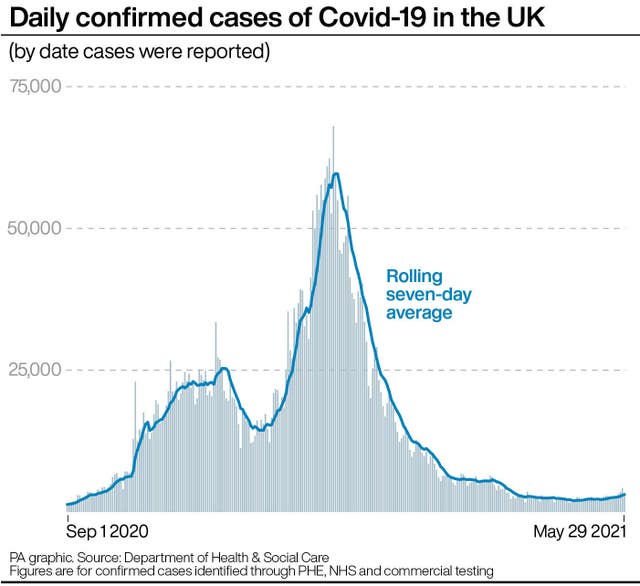Minister promises cautious approach amid warnings over June 21 lockdown lifting
Nadhim Zahawi said a decision on whether to proceed would be left until June 14.

Ministers will adopt a cautious approach in deciding whether to ease lockdown on June 21, with hospitals already under pressure and health experts warning against “charging ahead”.
The continued spread of the Indian coronavirus variant has cast doubt on the ability to scrap restrictions, with ministers considering plans to keep some measures – such as the continued use of face masks and guidance on working from home – in place.
Vaccines minister Nadhim Zahawi acknowledged “we have to be cautious” because of concerns about the infection rate.
The Government will wait for the latest data on June 14 before deciding whether to proceed with lifting England’s lockdown the following week.
He said the vaccine programme aimed to offer a second dose to all over-50s by June 21, but he told Times Radio “I could do with more supply” because “I will be able to protect more people more rapidly”.
Asked whether the remaining restrictions could be eased if cases were still increasing, he told BBC1’s Andrew Marr Show: “What I’m saying to you is we have to be cautious. We have to look at the data and share it with the country.
“Are we still vaccinating at scale? Big tick. Are the vaccines working? Yes.
“But are infection rates too high for us to then not be able to proceed because there are too many people getting into hospital? I don’t know the answer to it.
“But we will know it on, hopefully on the 14th, a few more weeks.”

He said that as the virus becomes endemic “we’re going to have to live with a certain amount of Covid being transmitted”.
Pressed on whether there could be a partial lifting of restrictions, with mask-wearing and working from home continuing, Mr Zahawi said: “We need to look at the data.”
The latest official figures showed:
– A further six people have died within 28 days of testing positive for Covid-19 as of Sunday, bringing the UK total by that measure to 127,781.
– Between May 24 and 30 there were 60 deaths reported within 28 days of a positive coronavirus test, an increase of 42.9% compared to the previous seven days.
– As of 9am on Sunday, there had been a further 3,240 lab-confirmed cases in the UK.
– The number of cases between May 24 and May 30 – 22,474 – was 26.8% higher than the previous seven days.
– Some 39,259,168 people had received a first dose by Saturday – up 190,822 on the day before – while 25,332,851 of them had been given both shots, an increase of 440,435.
NHS Providers chief executive Chris Hopson said hospital bosses were concerned about the transmissibility of the B1617.2 variant and the large number of people who have still to receive doses of the vaccine.
He warned that although hospitals were not expecting to be overwhelmed by a surge of Covid-19 cases, they were already stretched by going “full pelt” on dealing with the backlog of cases built up during the pandemic and urgent care needs.
Hospitals are operating under reduced capacity due to Covid-19 restrictions and increased numbers of coronavirus patients will add to difficulties by requiring wards to be reconfigured, he added.
“(The) current degree of pressure on hospitals is worrying especially since we saw clear summer demand surges in the two years before Covid-19,” he said.
“But if… success of (the) vaccination campaign means much lower levels of hospitalisation, serious illness and mortality, even with (the) new variant, that is very significant and important.
“This means there is a difficult decision to make for June 21.”
Linda Bauld, professor of public health at the University of Edinburgh, has said June 21 is “too early” to lift coronavirus restrictions in England.
She told Sky News: “I really think that it is too early to be charging ahead. I would like to see several more weeks’ data.”
She said the planned date is “very ambitious”, adding: “The 21st of June is very soon and I think to avoid more preventable deaths… we really need to be cautious at the current time.”
Dr Mike Tildesley, a member of the Scientific Pandemic Influenza Group on Modelling (Spi-M) Government advisory panel, said there was still “quite a lot of uncertainty” around the June 21 date.
He told LBC: “We are starting to see signs of course that cases are going up, but at the moment we’re still obviously reporting hospital admissions and deaths at very low levels.”
Communities Secretary Robert Jenrick was more upbeat about June 21, telling the Sunday Telegraph: “The Prime Minister will ultimately make the decision… but he’s been clear that at the moment, it appears as if the data is moving in the right direction, and we should be able to proceed with the next stage of the road map.”
But Chancellor Rishi Sunak told the Mail on Sunday: “We have to look at the data as it comes in. We will know more as we approach the date.”
British Beer and Pub Association (BBPA) chief executive Emma McClarkin said businesses needed to know sooner rather than later if restrictions are to remain after June 21.
“If the Government does leave any lingering restrictions in play then they really need to give us advance notice of that and it needs to talk seriously about financial compensation,” she told the BBC.
“But right now we are asking the Government to stick to their road map.”
Labour leader Sir Keir Starmer suggested the biggest risk to easing the lockdown on June 21 was “incompetence” in the Government.
He said “weak, slow decisions” by the Government on border policy had allowed the Indian variant to spread.





